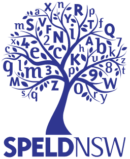Phonics! Phonics? Phonics.
This is a term we hear a lot but… What (exactly) is it? How do I teach it? And how do I know it is working?
Phonics, at its core, is the teaching of how phonemes (speech sounds) connect to letters and groups of letters. Nice and simple, right? Yes, but that’s not the whole story.
Sure, we have to teach that when a student sees ‘ch’ they are going to read it most commonly as the phoneme /ch/ as in ‘chip’. Often, we see practices like a focus sound of the week that leads to activities focused largely on colouring in pictures of things that start with that phoneme or grapheme hunting (looking for the ‘ch’ in books and around the room). But at SPELD NSW we see phonics instruction that is focused only on teaching individual letter and sound relationships or focused just on initial sounds as too narrow and missing the bigger picture… we need to teach students how to read words!
Phonics is not just about learning how phonemes or speech sounds relate to these squiggles we call letters. Phonics is about teaching students how to read words. How to decode (sound out) using their phonics knowledge and then blend those phonemes together to form a whole word that they can understand (or seek to understand).
Phonics instruction should focus learning new GPC and then very quickly practising how to decode and encode words containing that spelling. We want students using the new GPC to build simple words straight away.
Consider this example:
You have taught students the following GPCs: s, m, p, f, i, a, t, c
So, the students should be working on reading and writing words like ‘am’, ‘mat’, fit’…
Now you introduce the new GPC ‘d’. We don’t want students spending lots of time colouring in pictures of things that start with /d/. What we want is to immediately be practicing building, reading and writing words like ‘dip, mad, sad, dam’.
This way students are not just getting lot of repeated practice of reading the new GPC ‘d’ but they are also practicing the most important foundational skills: decoding, blending, and spelling. A win-win-win!
So, in a typical day we would encourage teachers to:
- Provide daily retrieval practice (reading and spelling) of prior taught phonics code. We call this the Daily Review. It can be whole class or with a partner, but the aim is reading and writing lots of words with known phonics code in a short space of time.
- Daily phonics lessons that explicitly introduce the new GPC and then immediately model how to read and spell words containing that GPC and only prior taught GPCs. Students then break off into pairs or work individually to practise reading and writing words containing the new GPC.
- Give students daily reading or fluency practice using decodables and decodable sentence strips with words containing phonics code taught a week or two ago. This delay in introducing decodable readers using this code ensures that the students will have had enough practice to accurately read words and sentences with those GPCs. This helps students develop automatic word reading and fluency.
Let your data do the talking
When we work with schools to analyse their phonics data, we see the same story time and time again. Students can quite easily learn their GPCs but knowing what to do with them is where things start to get wobbly! They know their ‘phonics content’ but they need to learn the important skill of using that phonics knowledge to read words! Ensuring that your phonics program is focused on GPCs AND word reading rather than just learning single sounds will set you on the right path to your phonics instruction laying foundations for strong literacy skills in the future.
Looking for some professional learning to help you learn more about teaching phonics to K-2 students? Join us for Evidence-Based Reading in Action or Teaching Reading in the Early Years to learn more about how we can get all children reading!




